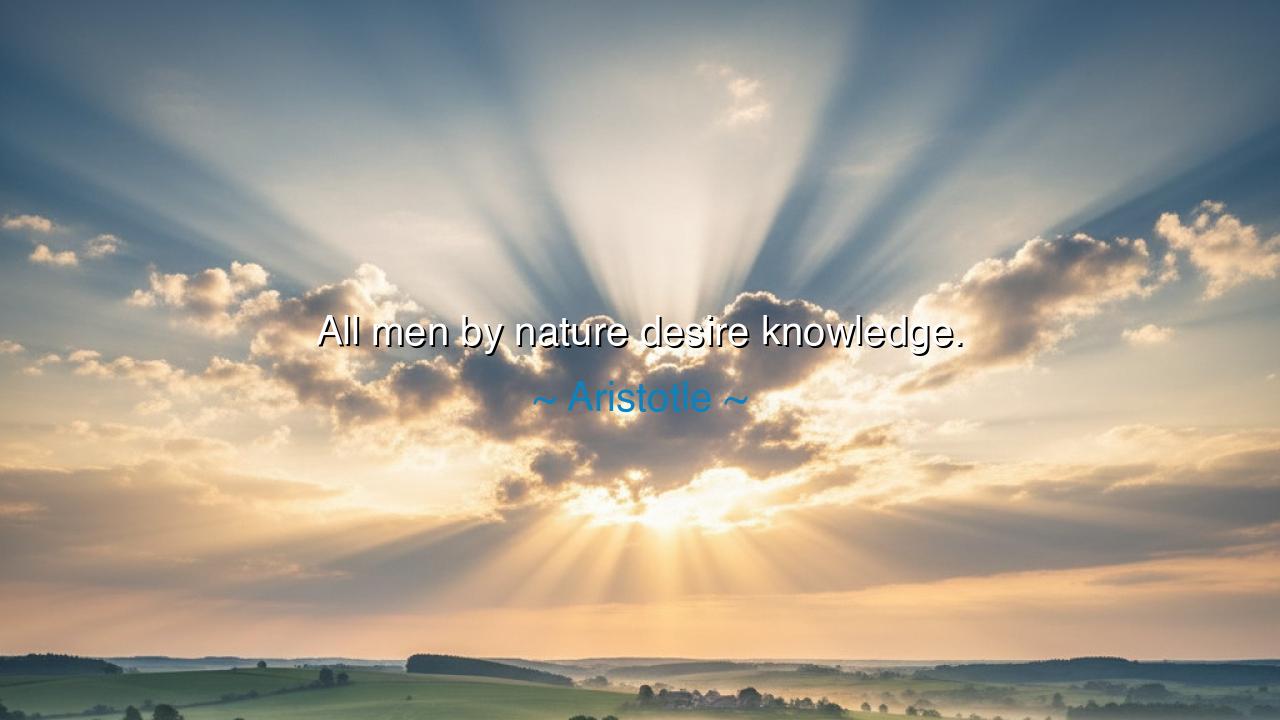
All men by nature desire knowledge.






Hear the immortal words of Aristotle, master of reason and teacher of kings: “All men by nature desire knowledge.” With these few words he unlocked the truth of the human spirit—that to know is as natural to man as it is for the flame to rise upward or the river to flow toward the sea. From birth, the soul of man thirsts for understanding, stretching toward truth as the plant stretches toward the sun. For it is not bread alone that sustains us, but the light of knowledge, which feeds the mind and gives meaning to existence.
Aristotle spoke from the heart of ancient Greece, where philosophers gathered in the marketplace and the grove, seeking wisdom as others sought gold. He observed the simplest things: the child who marvels at the stars, the craftsman who longs to master his trade, the citizen who debates the laws of the city. In all of these, he saw a pattern: that the hunger for knowledge was not taught but born, not given by law but etched in nature itself. It is a desire as ancient as man’s first gaze at the heavens, as enduring as his quest to understand death and destiny.
This truth has been proven again and again in the history of humankind. Think of the sailors of the Age of Discovery, who risked storm and death to uncover what lay beyond the horizon. Their pursuit was not only of riches, but of knowledge—new lands, new peoples, new maps of the earth. Or recall the scientists of the Renaissance, who tore away the veil of superstition to see the world more clearly. Galileo, gazing through his telescope, revealed that the earth moved around the sun, and though condemned by his time, he was driven by the same eternal hunger Aristotle described. The desire to know cannot be chained forever.
Yet Aristotle, in his wisdom, also implied that not all knowledge is equal. To desire knowledge is natural, but the path of the wise is to seek that which is noble, excellent, and true. For knowledge can elevate or corrupt, depending on the use to which it is put. The pursuit of truth should lead to freedom and flourishing, not to arrogance or destruction. Thus, the desire for knowledge is a gift, but it must be tempered with humility, lest man believe he is master of all things and forget the mysteries that remain.
The beauty of this teaching is that it gives dignity to every human soul. No one is born empty or worthless, for within each lies the seed of curiosity, the spark of wonder. Even the humblest person, with no riches or honors, carries within them the natural desire to know. And from that desire flows invention, discovery, poetry, and philosophy. In this way, Aristotle ennobled the entire human race, declaring that the pursuit of wisdom is not for the few, but for all.
What, then, shall we learn from this ancient truth? It is this: honor your desire for knowledge, for it is the deepest part of your nature. Feed it not only with shallow distractions, but with truths that enlarge your soul. Read, reflect, ask questions, and let curiosity guide you into wider fields of thought. Do not scorn your questions as weakness, for they are the very proof that you are alive, that you are human.
Therefore, beloved seekers, let your practice be this: nurture wonder as you would a flame. Seek daily to learn, not for pride, but for growth. When you encounter mystery, rejoice, for it means your journey has not ended. And remember always the eternal wisdom of Aristotle: all men by nature desire knowledge—and to pursue that desire is to walk the path toward the fullness of what it means to be human.






AAdministratorAdministrator
Welcome, honored guests. Please leave a comment, we will respond soon